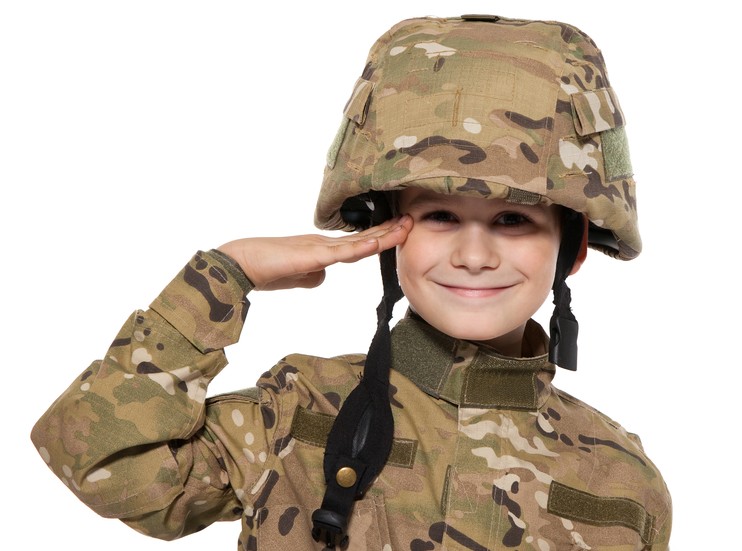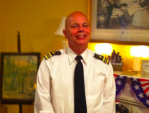“I think I should join the Army,” my husband said.
Videos by Rare
It was after 9/11, and he strongly felt he should join in his generation’s conflict. However, we had two kids. Many women told me I should’ve put my foot down and said “No” because children should trump military duty.
“Don’t you have kids?” one lady asked with furrowed brow after I was introduced as someone whose husband was in Iraq. “When he joined the Army, didn’t he realize he’d be deployed? What about your children?”
“Wars are complicated,” I began. “And the government needs adults over there to run things. Frequently, by the time guys are officers, they’re parents.”
In a child-centric culture that defines “good parenting” as a dad who never missed a soccer game, my explanation was as rhetorically forceful as Charlie Brown’s teacher assigning homework.
“Well, that’s where his priority should be,” the lady said, and that was that. Invoking “the children” always ends the conversation because you’re left in the unenviable position of defending your “anti-child” policies and, frankly, you’ve already lost. “He can’t be a father if he’s not there.”
I later relayed the conversation my friend, Anna, whose physician husband eventually deployed in the Air Force.
“If the entire population of ‘parents’ excluded themselves from military service, we couldn’t have stormed the beaches of Normandy, won at Gettysburg, or even gained our independence from Britain,” I complained.
“People like that just don’t get it. They close their eyes and hope someone else will do what needs to be done,” she said. “And you’re a living, breathing ‘someone else’ reminding them that somebody has to do something.”
I knew Anna was right — that this was something we just needed to work through ourselves. After months of listening to the kids’ muffled tears in their pillows, I felt I was driving a damaged car, waving out the window at the people honking behind me. Just go around. We have to go at our own pace.
One day at the library, I watched as a dad read a book about pirates to his son while the mom entertained their younger daughter. “What show-offs,” I thought. Who goes to the library as a family, anyway?
I meandered closer, much like an insect goes instinctively to the light that’ll kill it.
“Yo-ho, my friends, I have a tale to tell…”
The dad’s awful impersonation and casual happiness wounded me. Even after David returned from the war, he wouldn’t speak pirate.
I figured he’d be the type of guy that would experience Iraq and come home the same guy … except with more carefully honed political positions about the war. But he was different inside, and everyone knew it. David had been “the life of the party” but returned with an indescribable “edge,” and we fought over small things.
Of course, he was grieving. A number of his friends had been murdered — that’s the right word — in Iraq, and he’d seen things that isn’t even shown on the old television show “24.” I think sometimes our happiness at his return irritated him. We got to live our lives so joyfully while he was weighed down by things we’d never understand.
Five months after he arrived home, we attended a boy-scout banquet. My son, Austin, was supposed to bring a collection; so, he taped some of the Iraq money David brought home to a poster board. Under money with the former dictator’s picture, Austin wrote “boo, Saddam” and we laughed.
“Hey, I have an idea.” David left the room and returned with a bag of ornamental coins the Army uses to commemorate special events or units. “You can bring these, too.”
The coins tell a story I will probably never fully understand. He placed them carefully down on the table, picked one up, and read it. “Four of these ten men listed in this unit were killed.”
My daughter, Camille, looked up from her Legos and asked, “Are you sad?”
“I’m always sad,” he said. “But I’m thankful I knew them, and I’m thankful they lived.”
I wish I could tell that woman that my kids learned lessons from their dad, even in his absence … perhaps because of it. Camille learned about civic duty, Austin learned to persevere. They also learned their parents’ lives aren’t centered around their activities, which I suppose holds a certain amount of freedom as well. Although he wasn’t light-hearted enough to “speak like a pirate,” David certainly had “tales to tell.” They come out at breakfast or on a walk that the kids will remember forever.
Just for kicks, the next time I’m at a cocktail party, I’d love for someone to ask what he does for a living and respond, “An accountant?”
I’d look at him skeptically, because the deployment has made us parents who are less afraid, less skittish about duty, and even more in love. I think it gave our kids an advantage.
Then my skepticism might turn to pity. “Don’t you have kids?”
This article was adapted from a chapter in “Home and Away: a Story of Family in a Time of War.”




2 Comments
Leave a Reply2 Pings & Trackbacks
Pingback:What Veterans Teach Their Kids, Even When They’re Gone | Citizens for Self-Governance
Pingback:Is it Morally Irresponsible for Parents to Join the Army?